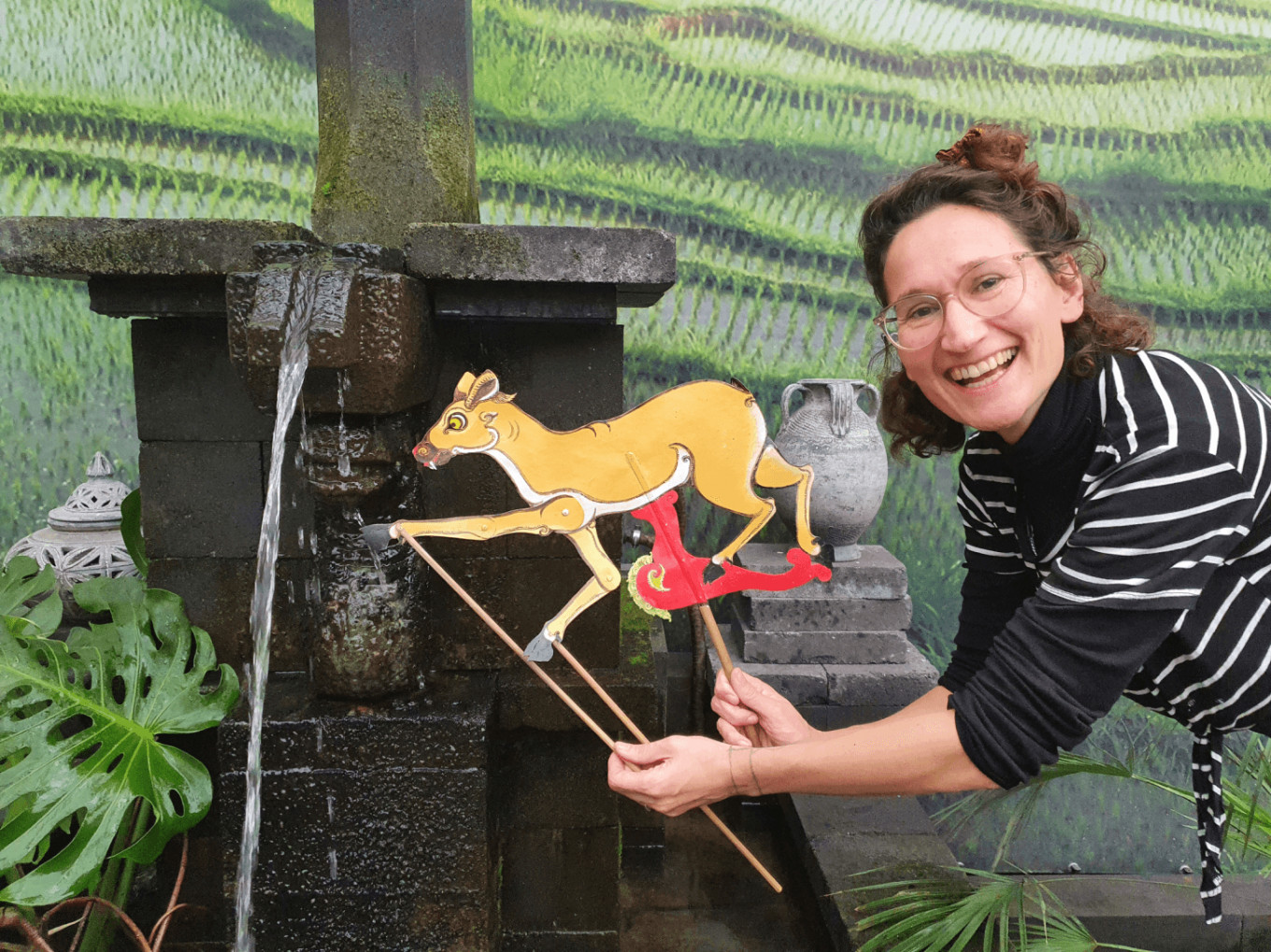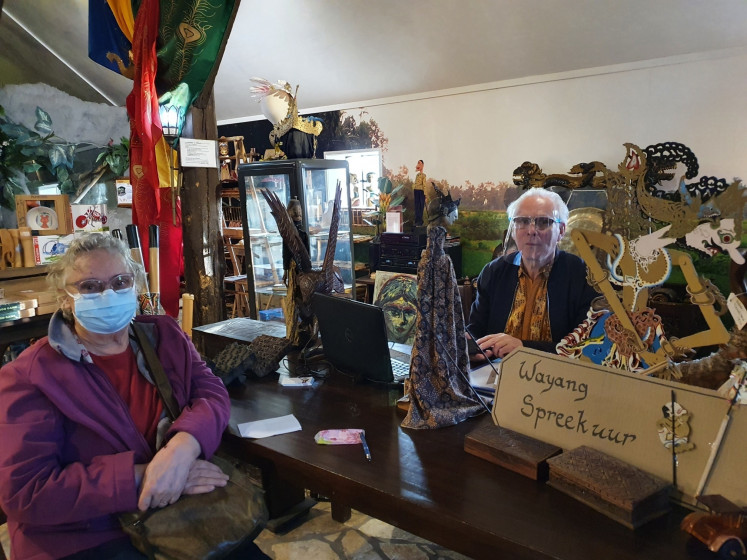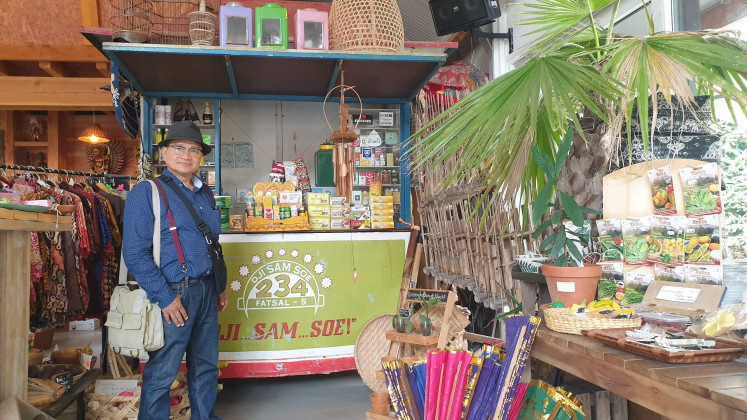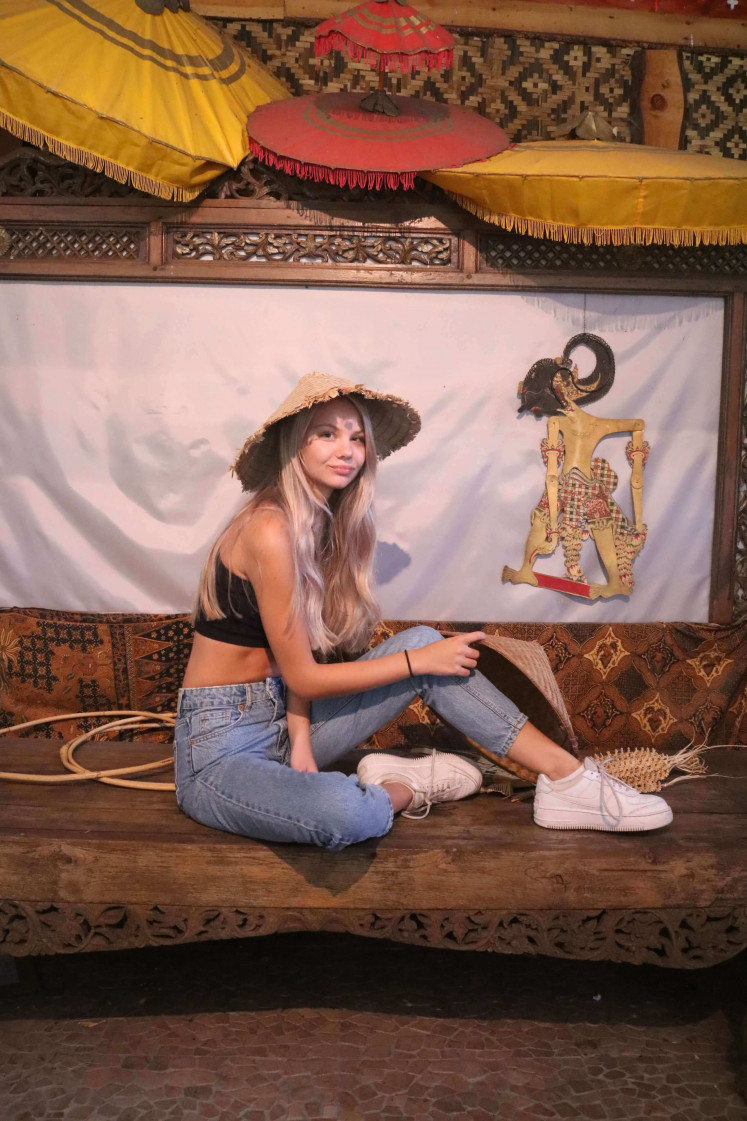From Mentawai to Kallenkote: Taman Indonesia transplants the archipelago to the Netherlands
Marlisa Wareman has transformed her experience from living in the Mentawai Islands into creative solutions for running Dierenpark Taman Indonesia, the first and only Indonesian zoological park in the Netherlands, where people can visit the archipelago without ever boarding a plane.
Change Size
 Light of inspiration: Marlisa Wareman poses with Wayang Kancil, a shadow puppet character based on the mouse deer. The puppet is part of "Wayang Stories", a virtual exhibition Wareman created to help sustain Dierenpark Taman Indonesia, the Indonesia-themed park she runs with her brother Diederik in Kallenkote, the Netherlands. (Taman Indonesia/Courtesy of Taman Indonesia)
Light of inspiration: Marlisa Wareman poses with Wayang Kancil, a shadow puppet character based on the mouse deer. The puppet is part of "Wayang Stories", a virtual exhibition Wareman created to help sustain Dierenpark Taman Indonesia, the Indonesia-themed park she runs with her brother Diederik in Kallenkote, the Netherlands. (Taman Indonesia/Courtesy of Taman Indonesia)
A
mid the calls of Bali starlings, sooty-headed bulbuls and crested mynas, Marlisa Wareman takes a seat in an uma. The traditional longhouse of the Mentawai culture stands in the middle of Taman Indonesia, which inspired Wareman to show her Dutch compatriots how culturally rich Indonesia is.
“I lived in Mentawai for more than a year with my eldest brother Vincent, who was conducting anthropological fieldwork there. Rather than joining Vincent on his return to the Netherlands, I decided to stay with his host family in the uma,” she recalled, referring to the Mentawai Islands regency in West Sumatra.
“I have grown into a part of that family, having my own tasks and responsibilities. Every morning, I used to go out in a canoe to get bananas, I learned how to make sago and visited friends at the other side of the jungle.”
Living in Mentawai for more than a year fueled Wareman’s passion for cultures and Indonesia. It also taught her to be creative and think outside the box. “In Mentawai, we did not have many facilities and the infrastructure was less developed [than] it is nowadays. We sometimes had to walk for two hours to reach our destination,” she said.
Armed with her creativity and perseverance, Wareman runs Dierenpark Taman Indonesia (Taman Indonesia animal park) in Kallenkote, the Netherlands, which she co-owns with her brother Diederik. Although the park has been closed for several months due to COVID-19 restrictions, the siblings are still determined to share stories about Indonesia with the Dutch people.
More than Bali
Taman Indonesia was initially founded as a bird park by when she was 15 years old. Her father is an avid bird watcher, while her mother had a taste for Indonesian cuisine, always inviting people to come to the park and enjoy Indonesian dishes.
“I was not interested in helping my parents. After Mentawai, I went to Amsterdam and Yogyakarta to pursue my studies, and I got involved in Metro TV as a reporter afterwards,” she said.
When her mother passed away in 2008, Wareman returned to the Netherlands to help Diederik and her father maintain the park, bringing her love of culture and passion for Indonesia back to Kallenkote.

“When speaking of Indonesia, many people would think directly of Bali, or perhaps Java. But Indonesia is also Nias, it is also Mentawai, and it is dozens of other tribes and cultures that thrive far beyond Bali. We want to show our visitors Indonesia’s diversity through food, objects, music, flora, fauna and more,” Wareman explained
The park is home to around 40 bird species, several reptile species, including the Indonesian blue-tongued skink, and several mammalian species like the civet and the muntjac, or barking deer.
In their mission to create the ultimate Indonesian experience, Marlisa and Diederik also collected many iconic objects for the park. The uma, a becak (pedicab), an onthel (roadster bicycle) with baskets and a Dji Sam Soe-branded warung (kiosk), stocked with bottles of kayu putih (cajeput) oil and sachets of instant teh jahe wangi (ginger tea), are among the objects on display at Taman Indonesia to help visitors feel as if they are actually in the country.
Collective goodwill
In addition to the items the siblings collected along their travels in Indonesia, the park also receives donated Indonesian objects. It also serves as a venue for people with hobbies and interests related to Indonesia, which has often led to new items and exhibitions. Wareman says she prefers to spend most of her time at the cash register, “where I can talk with the visitors and listen to what they are passionate about”.
“So when someone told me about his passion for kris, the seed for a kris exhibition was planted,” she said. Soon after, Wareman asked around and received 20 krisses donated by collectors from all over the Netherlands.
This goodwill is unique, particularly considering that the park is located in a small and serene village in Overijssel province, around 120 kilometers from Amsterdam – a long way off for most Dutch people. With its population of around 320, Kallenkote doesn’t see a large influx of visitors from surrounding areas, either.
“Quite a number of our visitors are of mixed European and Indonesian descent. We aim to create a place where first generations can bring their children to share stories about their family’s history,” said Wareman, whose mother was born in Malang, East Java. Visiting the park would thus offer succeeding generations of Indonesian-Dutch families an opportunity to learn about their cultural roots.
“My Indies grandparents passed away when I was still a child. Now I wish I could ask them [everything] about their life in the former Dutch East Indies," she added.
The park also attracts Indonesian visitors like Eka Tanjung, who has lived in the Netherlands for more than 30 years. When the pandemic struck and he was no longer able to travel to Indonesia to visit friends and relatives, Eka began searching for any traces of Indonesian culture in the Netherlands. Last June, before the second lockdown, he travelled to Kallenkote in search of “obat rindu”, or a cure for his homesickness.

“The first time I set foot in the park’s greenhouse, I felt as though I had gone back to my childhood village in Solo,” Eka said. “I saw the same trees we had in our garden and I felt the temperature of the tropics that made me sweat. When I closed my eyes to listen to the kutilang [sooty-headed bulbul] chirping in the park, I [imagined] myself along the banks of the Solo River. A beautiful, carefree childhood.”
Dutch travel blogger Anouk Ellianne Koster visited Taman Indonesia “to get a taste of Indonesia”, according to a caption on her Instagram account (@anoukelliane). The accompanying photograph shows Koster wearing a caping, a traditional farmer’s hat, next to a wayang puppet.
“I graduated from high school in July 2020 and had planned a gap year afterwards to travel around Southeast Asia, including Indonesia,” Koster said. But she had to postpone her travel plans because of the pandemic and instead took a trip to Ossenzijl, around 22 km from Kallenkote.
“I have never been to Indonesia before and I can only compare the Indonesian details in the park with what I read on the internet about Indonesia, but I was directly impressed on seeing the various details, such as clothing, tropical plants, reeds, statues and Indonesian animals,” she said about her visit to Taman Indonesia.

Koster says she still plans on traveling to Indonesia, once the conditions allow her to do so.
Virtual escape
Before the pandemic, Wareman traveled to Indonesia each year during the winter holiday in the Netherlands, when the park is closed for maintenance. But the two extended lockdowns the Dutch government imposed challenged her and her brother, like many entrepreneurs, to draw on their creativity to do whatever they could to survive financially.
Again, her lessons from Mentawai proved crucial. Instead of receiving visitors to the park, she and Diederik created several programs to bring Indonesia into people’s living rooms. Their latest project is “Wayang Stories”, which introduces the various puppet characters through online puppet-making workshops, performances and discussions in which visitors can “consult” a wayang expert on their puppet.
The sister-brother duo has also launched a virtual cooking workshops for people interested in Indonesian cuisines.
“Our loyal visitors, members and ambassadors are essential to supporting and inspiring us. Recently, a lady who had cleaned her attic room found vinyl with songs by Dutch singer of Indonesian descent, Wieteke van Dort,” said Wareman. The woman didn’t listen to the record anymore, so she donated it to the park.
“So the idea began to hold an online auction for items related to Indonesia. The profits go to the animals and park maintenance,” Wareman said. Aside from the vinyl, other items donated to Taman Indonesia’s auction include an autographed T-shirt of former Persib soccer player Sergio van Dijk and woodcarvings from Bali.
Until the park gets the green light to reopen, Wareman is giving free rein to the adaptive creativity she learned from the Mentawai people, so she can keep inspiring people with the many stories of Indonesia through online programs.
Eka is confident that other Indonesians living in the Netherlands will also make an online visit to the park.
“Because the memories we left in Indonesia, we can find and feel them again at Taman Indonesia, especially [at a time] when we have difficulty going to Indonesia due to the pandemic,” he said.









